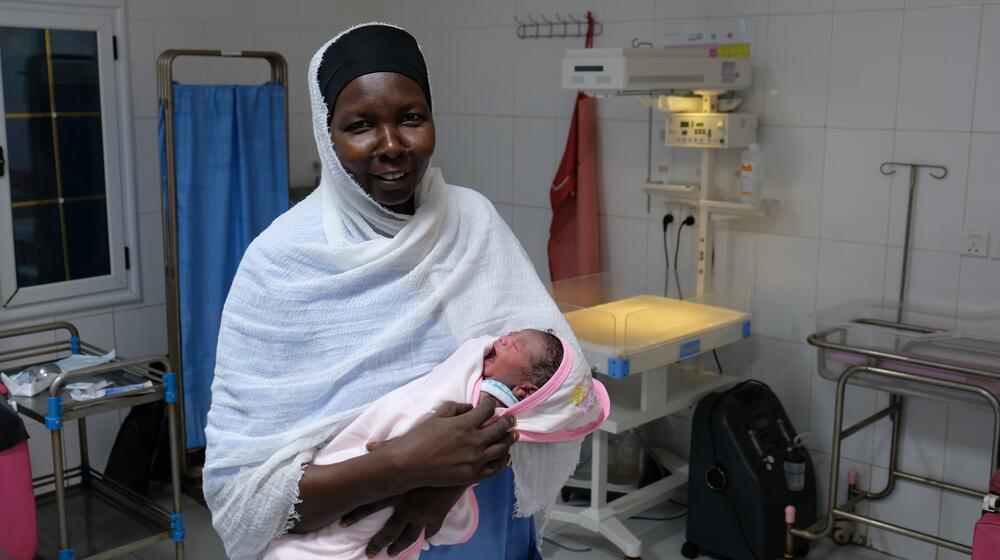News
In Port Sudan, UNFPA helps ensure safe birth for women and girls fleeing violence in Khartoum
- 30 June 2023
News
PORT SUDAN, Sudan – “I lost everything in the war. I did not want to lose my unborn child too.” At nine months pregnant, Omnia* left her home and everything she knew behind to escape the violent conflict engulfing Sudan’s capital Khartoum.
Although travelling in her situation was dangerous, she felt she had no choice: Roiling insecurity, active shooting, and the looting and destruction of health facilities meant she hadn’t been able to see a doctor in weeks. It was an arduous, five-day journey, and in early June she arrived in Port Sudan, on the coast of the Red Sea state.
“She was crying all the way from Khartoum,” recalled her mother, who travelled with her. “She was afraid that the birth would happen while we were on the road to Port Sudan.”
Omnia made it to the Port Sudan Teaching Hospital, where she went into labour. Hers had been a difficult pregnancy and she faced complications with the delivery, but health staff helped her to give birth by Caesarean section to a healthy baby girl, named Lana.
“Now I see her smiling again, thanks to the doctors and midwives in the hospital,” said her mother.
Urgent need for health services
The Port Sudan Teaching Hospital is the state’s only maternity hospital and serves a population of some 1.6 million people. UNFPA, the United Nations sexual and reproductive health agency, and partners in the Red Sea state are supporting the facility with medical equipment, supplies and staff training to ensure displaced pregnant women and girls arriving in Port Sudan from across the country can give birth safely.
But as the conflict wears on and critical services buckle, it is unclear how long hospitals like this one can keep helping those arriving destitute and in distress.
“Our team is fully dedicated to supporting the women and girls arriving from Khartoum, but we are in urgent need of more supplies, including fuel and life-saving equipment and medicine,” said Dr. Randa Osman, general director of the hospital.
At least 46 health facilities across Sudan have come under attack, and nearly two thirds are no longer functioning. In Khartoum fewer than half of health-care services are still operating, meaning that critical supplies, including for obstetric emergencies and post-rape kits, are running dangerously low. Meanwhile medical staff are unable to travel to work because of roadblocks and ongoing fighting.
As one of the midwives assisting Omnia that day recalled, “There was a serious risk to [her] life, but she made it just in time. I always wonder what happened to the pregnant women who did not make it to a safe place.”

Women and girls at acute risk
Since the conflict between the Sudanese Armed Forces and the Rapid Support Forces began on 15 April, some 2.5 million people have been forced to abandon their homes in search of safety, with around 2 million of them displaced within the country. Even before the onset of the conflict, more than 3.7 million people were internally displaced, few with any access to health care or basic supplies.
There are over 260,000 pregnant women in Sudan at present, an estimated 90,000 of whom are expected to give birth in the next three months. All these women and girls are in need of immediate access to essential reproductive health services, as are more than 4 million women and girls caught up in the conflict, who are at heightened risk of sexual abuse and exploitation. Yet as the bloodshed continues, more and more health centres are forced closed.
The latest humanitarian response plan for Sudan aims to assist 24.7 million people, with 11 million in urgent need of health services and an estimated 2.6 million women and girls of reproductive age. Many of them will not be able to access the services necessary to save their lives – services Omnia said she felt lucky to reach.
“I am now in good health both mentally and physically thanks to the doctors and midwives of this hospital. I owe them my life.”
*Name changed for privacy and protection